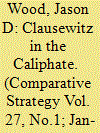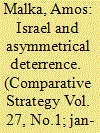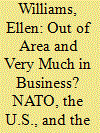| Srl | Item |
| 1 |
ID:
081290


|
|
|
|
|
| Publication |
2008.
|
| Summary/Abstract |
Out of necessity, military doctrine evolves in response to changes in the strategic and tactical environment. In the time since Clausewitz first articulated the center of gravity (COG) concept, his theory has taken many forms that reflect the ever-changing nature of warfare. In the post-9/11 security environment, COG doctrine must be further revised in order to be of use against the elusive, asymmetric enemies that now threaten the United States and its allies. These revisions must focus on redefining the concept and its applicability, as well as on how to identify enemy COGs.
|
|
|
|
|
|
|
|
|
|
|
|
|
|
|
|
| 2 |
ID:
081287


|
|
|
|
|
| Publication |
2008.
|
| Summary/Abstract |
This article analyzes the elements of the asymmetry of deterrence in the Israeli context. It reflects my own insights derived from research and my long service in the Israeli Defense Forces (IDF), including a term as head of the IDF Intelligence Branch. This article contains the personal insights of someone who had the opportunity to be involved in both formulating deterrent positions and observing their effect on "the other side of the hill." Even taking into account the differences between the Israeli case and others, the Israeli case study may shed some light for other Western parties facing terrorist threats
|
|
|
|
|
|
|
|
|
|
|
|
|
|
|
|
| 3 |
ID:
081289


|
|
|
| 4 |
ID:
081293


|
|
|
|
|
| Publication |
2008.
|
| Summary/Abstract |
French diplomatic and military operations in Djibouti, the Red Sea and the Gulf of Aden have or are in danger of becoming seriously compromised and weakened, to the detriment of French policy in Africa and the Middle East. This article is a brief review of the French military presence in Djibouti and the Horn of Africa. It is written from a French viewpoint regarding how to either remove or enhance French capabilities in the Horn of Africa, with policy options provided. It is equally important that the U.S. presence be removed from Djibouti. Introduction of the European Union (EU) and expansion of the African Union may benefit France. In the end, France should adopt a specific policy that would benefit France militarily, exclude the United States, and shift funding from France to the EU.
|
|
|
|
|
|
|
|
|
|
|
|
|
|
|
|
| 5 |
ID:
081291


|
|
|
|
|
| Publication |
2008.
|
| Summary/Abstract |
While there is some uncertainty about the direction of the U.S. missile defense program, there can be little question that the threats posed by ballistic missiles and the availability of nuclear weapons to potential adversaries will continue to grow well into this century. We will need new capabilities, because, over the long term, the currently configured and planned terrestrial-based missile defense system will be unable to deal with increasingly sophisticated countermeasures and shifting threats. Maximizing protection of the United States and its allies against new threats in the decades ahead can be achieved by supplementing fixed ground-based defenses with mobile defenses, using platforms on land, at sea, or in space. Space seems to have the most to offer if we are striving for global and timely protection. It will be critical to future security strategy to continue efforts to integrate offensive and defensive capabilities in order to bring the full power of our armed forces to bear on the dangers we will face in the years ahead.
|
|
|
|
|
|
|
|
|
|
|
|
|
|
|
|
| 6 |
ID:
081292


|
|
|
|
|
| Publication |
2008.
|
| Summary/Abstract |
This paper seeks to determine why the United States chose to bypass NATO after the September 11, 2001 terrorist attacks and the relative strengths and weaknesses of alliance and coalition operations, through an examination of NATO's missions in Bosnia and Kosovo and U.S.-led coalition operations in Afghanistan and Iraq. While the United States emerged from NATO's two Balkans missions with a belief that its operational freedom and flexibility had been hampered by operating within alliance constraints, coalition operations in Afghanistan and Iraq raised key questions about whether ad hoc coalitions are the most appropriate mechanisms for conducting such operations. NATO's contributions to postcombat reconstruction and stabilization also highlighted some of the core advantages to be derived from working through the alliance. If NATO can follow through on the transformation agenda it has undertaken since the 2002 Prague Summit, the indications are that the United States is more likely to turn to NATO for future operations and that NATO's days as a "toolbox" may well be numbered.
|
|
|
|
|
|
|
|
|
|
|
|
|
|
|
|
| 7 |
ID:
081294


|
|
|
|
|
| Publication |
2008.
|
| Summary/Abstract |
Great powers can pursue deliberate "Trojan horse" policies to transform rising and geostrategic secondary states into followers and supporters, rather than challengers. I contend that a great power can use economic statecraft, and in particular trade agreements, to deliberately promote shifts in the societal distribution of power in a target country. The intent is to strengthen the political power of societal and economic actors who have a stake in deepening international ties, while opponents of such policies will be weakened politically and economically. The societal winners will then apply pressure on the government to support their preferred outward-oriented grand strategy. I term this process the "second face of security," since it entails a less direct and more nuanced method of creating security. In contrast, the "first face of security" entails direct attempts to create security by influencing other governments through military or economic statecraft. I apply this model to the case of Jordan and argue that Washington has used trade agreements to strengthen the outward-oriented internationalist bloc in order to assist the palace in its domestic and international realignment toward commercial liberalization, political democratization, and normalization of relations with Israel.
|
|
|
|
|
|
|
|
|
|
|
|
|
|
|
|
| 8 |
ID:
081288


|
|
|
|
|
| Publication |
2008.
|
| Summary/Abstract |
In the evolving American debate over strategy toward the Islamic Republic of Iran, the idea of economic warfare-the coordinated application of punitive trade/inflationary/socioeconomic pressures-has received comparatively little attention. This is somewhat surprising, given the intrinsic vulnerabilities, ranging from a heavy dependence on foreign refined petroleum to a centralized economic hierarchy, now visible within the Iranian economy. This article outlines these "points of entry," and details the economic approaches that U.S. policymakers can employ in order to convince the Iranian regime that the real costs of its nuclear program are likely to outweigh the potential benefits of atomic acquisition
|
|
|
|
|
|
|
|
|
|
|
|
|
|
|
|